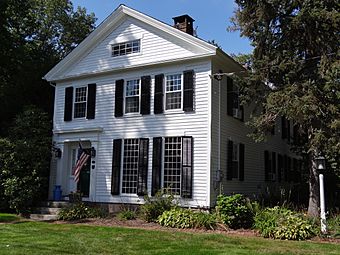Levi B. Frost House facts for kids
|
Levi B. Frost House/Asa Barnes Tavern
|
|
|
U.S. Historic district
Contributing property |
|
 |
|
| Location | 1089 Marion Ave., Southington, Connecticut |
|---|---|
| Area | 1.8 acres (0.73 ha) |
| Architectural style | Greek Revival/Colonial |
| Part of | Marion Historic District (ID88001423) |
| NRHP reference No. | 87002037 |
Quick facts for kids Significant dates |
|
| Added to NRHP | November 20, 1987 |
| Designated CP | December 21, 1988 |
The Levi B. Frost House, also known as the Asa Barns Tavern, is a very old building in the Marion village of Southington, Connecticut. This house shows over 200 years of Southington's history. It's listed on the National Register of Historic Places twice. This means it's super important for its design and its connection to New England's past.
Contents
The Asa Barns Tavern: A Revolutionary Stop
This building became a busy tavern around 1765. It was run by Asa Barns. Back then, Marion Avenue was a main road. It connected the towns of Bristol and New Haven.
Hosting a French General
The tavern was known as the Barnes Tavern. Many travelers stopped there. One famous visitor was a French General named Jean-Baptiste Donatien de Vimeur, comte de Rochambeau. He was leading French troops during the American Revolutionary War.
On June 26, 1781, General Rochambeau and his officers camped nearby. They stayed for four nights. Landlord Barns welcomed them to his tavern. He even held a big party for them! Many young women from the area came. They were very excited to dance with the polite French officers. Rochambeau and his officers visited the tavern again on their way back in October 1782.
Levi B. Frost: From Blacksmith to Bolt Maker
Asa Barns lived in the house until he passed away in 1819. After that, his son rented the building. Two men, Micah Rugg and Levi B. Frost, used it. They were early makers of carriage bolts in Marion.
A New Owner and Business
The partnership between Frost and Rugg didn't last long. In 1820, Levi B. Frost bought the house. He was a blacksmith. He was famous for shoeing oxen. He even invented a special tool to help control the oxen. People came from far away to have their oxen shod by him.
Frost used the house as his blacksmith shop, his home, and a small country store. He started making bolts right there. In 1842, his business grew so much that he moved it. He built a factory across the street. His company, L. B. Frost & Son, even invented the first machine to shape bolt heads. By 1844, they were making nuts too. His company stayed in business for many years.
A Community Leader
Levi B. Frost became a very important person in the American bolt industry. He was also a leader in his community. He held several local jobs. He even served in the State House for many years. Frost died in the house in 1865. His family continued to own the home until the 1920s.
The House's Changing Look
In 1836, the front part of the house burned down. Levi B. Frost, who was wealthy by then, rebuilt it. He used a popular style called Greek Revival. This style was common in the mid-1800s.
Greek Revival Features
The rebuilt front of the house has a triangular roof section called a pediment. It has a front entrance with columns on the sides. These details are typical of Greek Revival buildings.
What's unusual is how long the house is, about 50 feet. This might be because parts of the original 1700s building were kept. Experts believe the large room at the back is older. It has old wooden floors, a big cooking fireplace, and a stone hearth. This room was likely the tavern's taproom before the fire. The beams under the back of the house are still tree trunks with bark. This also shows that this part is very old.
The front of the house looks newer. It has wide pine floors and a main staircase. These parts show the design from the mid-1800s.
A Protected Historic Site
The Levi B. Frost House has always been a private home. In 1987, it became a protected site. It was added to the National Register of Historic Places. This protects it because of its important history and architecture. It is also part of the Marion Historic District.
 | Delilah Pierce |
 | Gordon Parks |
 | Augusta Savage |
 | Charles Ethan Porter |



